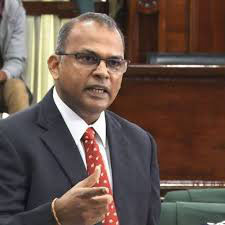Amidst complaints over a lag in the release of COVID-19 test results, Minister of Health Dr Frank Anthony on Friday stated that plans are underway to automate Guyana’s testing for COVID-19, thereby boosting its capacity, but a number of things must be put in place.
In an interview with Stabroek News, Dr Anthony informed that the National Public Health Reference Laboratory currently has one Polymerase Chain Reaction (PCR) machine, which is not an automatic machine, and therefore takes a much longer time to process samples that are submitted.
“What we are trying to do now is to automate that process”, Dr Anthony said, while explaining that there are different types of PCR machines that would speed up the testing time. The health ministry, he said, is currently in the process of procuring automatic PCR machines. The automatic machines are being used in various international airports and can process approximately 96 tests within an hour.
“We want to reduce the turnaround time to get the test and to do it faster and process larger volumes,” the minister said, before adding that it will in turn assist in clearing the backlog at the laboratory.
Officials in hinterland regions, including Region Seven, have voiced their frustrations at the delay in the issuance of test results from samples sent to the National Public Health Reference Laboratory.
Anthony mentioned that a PCR machine which was donated to Guyana some time ago and left at the wharf is now at the reference lab but is not yet in use. He explained that it takes much more than just acquiring the machines to have them operational at the laboratory. “Because of the samples that we are dealing with, [they] potentially have the virus and therefore when you’re processing the samples you have to do it in such a way that you do not contaminate yourself,” he explained. The samples, the minister noted, must be processed in a biohazard cabinet and further machines have to be installed in laboratories or rooms that meet the standard of having specific types of airflow and the cabinets must be properly installed.
Dr Anthony told this newspaper that even though the machine was recovered, a number of other things are needed to get it up and running. “It’s not an automatic thing that you can just get a machine and put it on a cupboard and utilise it. It doesn’t work that way.”Additionally, he mentioned that the health ministry is trying to see how many other machines can be accommodated at the laboratory in order to expand the facility and continue using the existing machines.
Former health minister Volda Lawrence had spoken of another PCR machine which was taken from the Guyana Livestock Development Authority that could be used if necessary, however, that machine was reportedly not put to use. However, Dr Anthony noted that that machine is also a manual PCR machine and so testing would still take a long time.
As it relates to the adoption of rapid testing in Guyana, the minister said that only PCR tests can be used as a diagnostic test to show whether someone has contracted the virus. While the only type of rapid tests that are available in Guyana are the tests that are done to detect the antibodies in persons who had the virus, there is another type of rapid test that can detect the viral antigens, but that is currently not available in Guyana. The antibody rapid testing, he reiterated, cannot be used as a diagnostic test for the virus.
“These tests [antibody rapid tests], they can play a role if you want to do like some level of screening and there are different protocols that people have come up with,” Dr Anthony pointed out, while adding that in some cases they are used and depending on the results, are then backed up by PCR testing. However some institutions are not using the rapid tests in conjunction with the PCR testing which is how it should be done.
“While the antibody test, there is a role for it, that role is perhaps in places where we suspect that a lot of people might have been infected, you can use that as a rapid screening tool but not a diagnostic” the health minister emphasised. The use of rapid testing in Guyana he said, has been authorised for use in that limited context as only for screening.
The minister also took time out to condemn the spread of false claims in relation to testing in Guyana which he called reckless. He assured that there are no fake COVID-19 tests in Guyana and no contaminated tests kits were sent to Guyana. Further, he added that testing in Guyana is only done with equipment and testing reagents from validated and certified sources.
A press release from the Ministry of Health confirmed that testing procedures in Guyana follow international standards and that the country currently has a well-trained COVID-19 testing staff.





